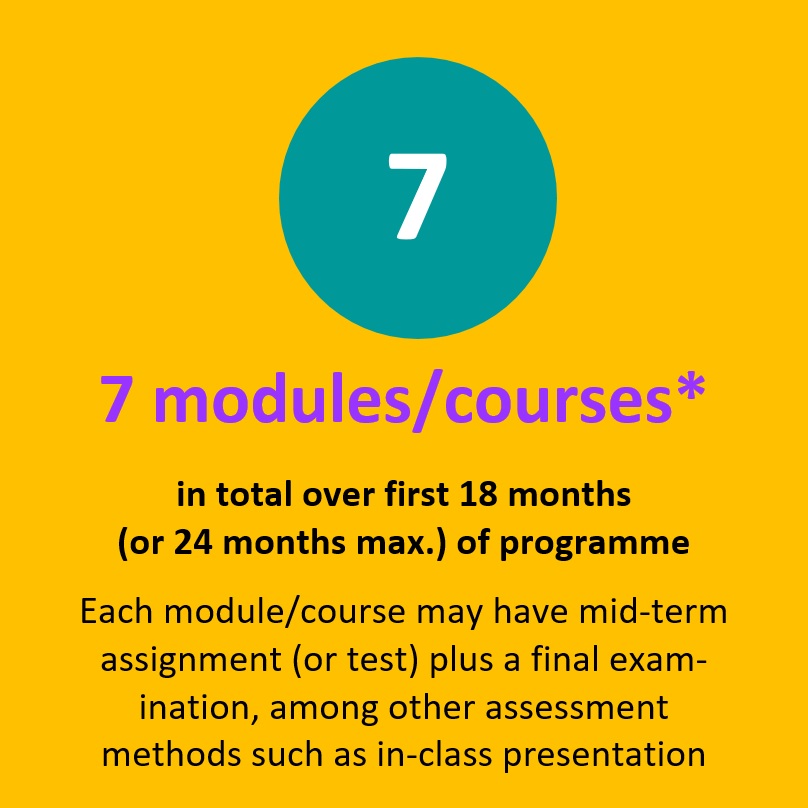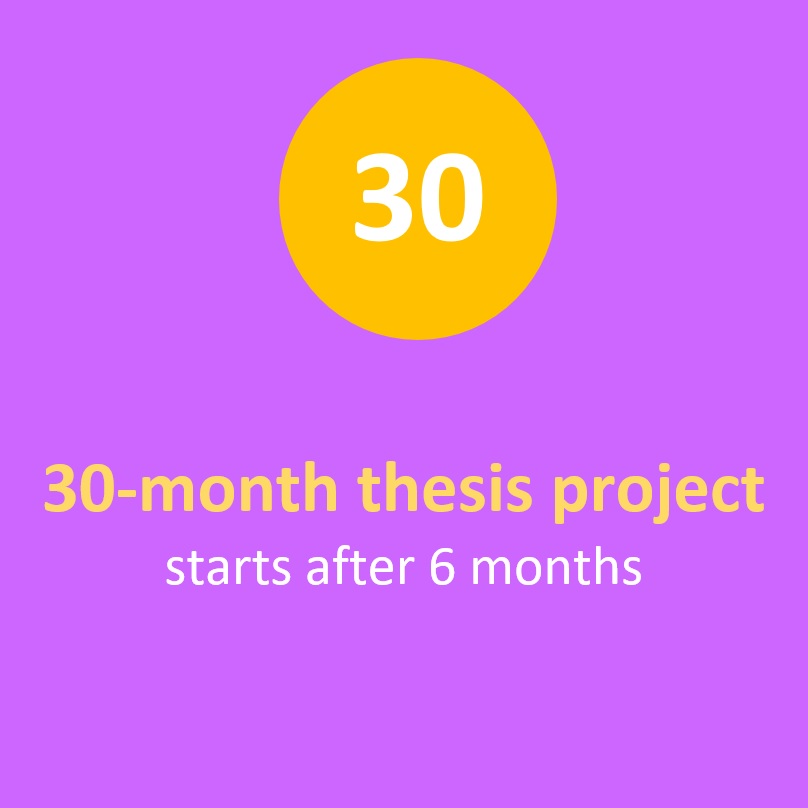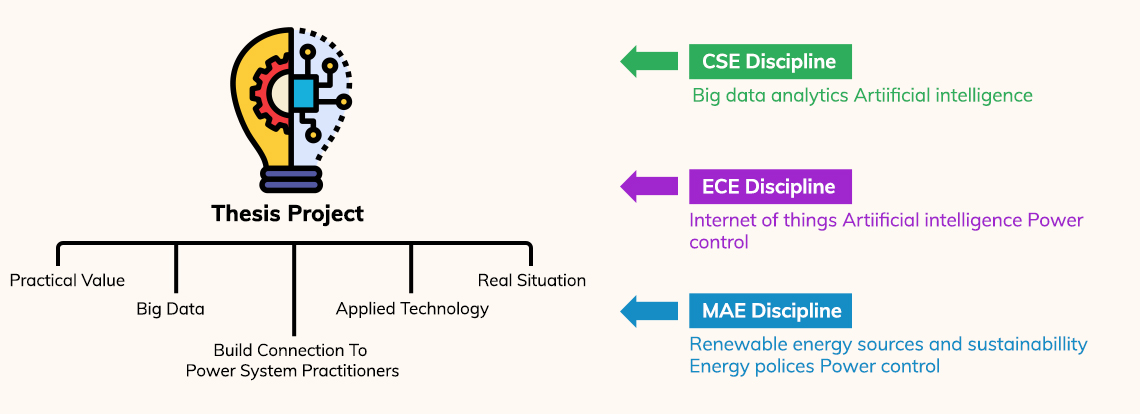Curriculum
The dual master’s degree programme contains elements of academic research combined with professional practice, covering specific knowledge of power system operation and management along with the application of the latest innovation and technology, such as big data analytics, Internet of Things (IoT) technology and artificial intelligence. Classes will be conducted both in a traditional classroom setting and through online distance learning. The programme consists of coursework and a thesis project as technical components (equivalent to 240 Strathclyde credits or 48 HKUST credits), in additional to generic components such as professional development, language and seminar courses.
*Note: 5 Strathclyde credits equivalent to 1 HKUST credit




Strathclyde Modules (2 core, 2 optional, and 1 professional practice)
CORE MODULES
Core module 1
Key power systems concepts and foundations
This module will enable students to gain a detailed understanding of the main concepts related to the principles of electrical systems and the theory underpinning their behaviour, and will present an introduction to and overview of analysis, design and performance of electrical power systems, both from traditional and future perspectives.
It acts as a comprehensive foundation and refresher module for both relatively inexperienced candidates, or those from non-specialist electrical backgrounds, and those with experience of electrical engineering.
The syllabus will include:
- Overview of the main components of electric power systems and their functions.
- Concepts of voltage, current, frequency, resistance, inductance, capacitance, reactance, phasors, AC, DC, basic alternating current relationships, three-phase systems.
- Power flow and stability: basic concepts of load flow, network equations; thermal, voltage, steady state and transient stability; equal area criterion; effects of control equipment.
- Transmission and distribution networks: analysis of circuits with overhead lines and underground cables, ABCD parameters for long lines, voltage regulation, surge impedance loading and reactive compensation, circuit loading limits, transformers, losses and efficiency, ladder iterative technique for radial circuits.
- Generator unit characteristics: control of power and frequency, VAr and voltage control and power quality.
- Transformers and switchgear.
- Controlling voltage and network branch flows and loadings.
- Unbalanced systems.
- Electro-mechanical stability.
- An introduction to and overview of monitoring and protection systems.
- An overview of emerging and future changes and challenges to electrical power system behaviour and operation.
On successful completion of this module, participants will:
- Have a clear understanding of the components of power systems and the theory and concepts underpinning various aspects of power system behaviour.
- Be able to carry out calculations relating to power flow.
- Have an understanding of generation, transmission and distribution systems and an overview of issues that will impact upon future power system behaviour and operation.
Core module 2
Power system operation, control and protection
The aim of this module is to enable students to appreciate the principles of operation, control, and protection of present-day and future power systems. This includes a relatively detailed treatment of power system analysis, the various roles and functions required of transmission and distribution system operators, voltage and frequency control in typical power systems, and a focus on protection functions and technologies which are required to ensure safety and reliability.
The syllabus will include:
- Design and analysis of power systems, including analysis for a variety of purposes.
- Standards and processes relating to transmission and distribution system operation and control.
- Why is protection required? Types of faults and conditions to be protected against – review of faults, calculation of fault levels and the impact of faults.
- System strength and inertia concepts.
- Description of protection system performance characteristics: discrimination, stability, sensitivity, speed of operation.
- Economics of protection systems and typical applications at various voltage levels.
- Components of protection systems and protection philosophy, unit, non-unit, provision of backup.
- Transducers: CT, VT and CVT. New types of sensors.
- Protection relays: history - electromechanical, operating principles of basic attracted armature, balanced beam and induction disc relays.
- Modern protection systems.
- Communications for protection systems: applications, overview of physical means (and their relative merits) of communicating between relaying points.
- Overcurrent, distance and differential protection.
- Protection of plant and equipment – protection of distributed generation and future networks (including loss of mains and anti-islanding protection).
- Future challenges relating to changing power system behaviour during disturbance and faults and an overview of present research efforts concerned with addressing these challenges.
Upon successful completion of this module, participants will:
- Have in-depth knowledge relating to methods and techniques for the analysis and design of transmission and networks.
- Understand the roles of network operators in maintaining the operation of transmission and distribution systems.
- Understand how voltage and frequency are controlled in present-day power systems, and the challenges which will impact future systems, along with the potential solutions.
- Understand fault phenomena in power systems and the reasons why these must be protected against.
- Have broad knowledge of different means of providing power system protection and have the ability to specify and configure a number of widely-used protection schemes.
- Understand future challenges and potential solutions to issues associated with future power system operation, control and protection.
OPTIONAL MODULES (CHOOSE 2 FROM 5)
Optional module 1
Power electronics conversion and control
The amount of power electronics devices connected to the power system is increasing every day and it is expected that almost all of the generated power in the near future will be interfaced through a power converter. Furthermore, the use of HVDC links both within AC power systems and between separate AC systems is also increasing, and converters are now a critical element of the modern power system, with a very strong influence over the performance and behaviour of the power system, during both steady-state and, in particular, during transient network conditions.
There are several advantages relating to power electronics, and these will be covered in the module. Power electronics allow optimal control of renewable energy sources, efficient energy transmission and flexible power system operation.
This module focuses on power electronics topologies and control for grid-connected applications such as wind turbines, solar, energy storage, FACTS and HVDC transmission systems.
The syllabus will include:
- An introduction to switching devices used in power converters and the most common topologies including controlled and uncontrolled rectifiers, DC choppers and inverters.
- Review of power semiconductor devices: Ratings, switching characteristics and limitations.
- Circuit Topologies: Principles of switched mode power conversion, DC-DC and DC-AC converters, switching frequency and thermal limitations.
- Modulation: Pulse with modulation and synthesis of AC waveforms.
- Control requirements for grid connected converters: synchronisation, current and voltage control loops.
- System operation, power quality requirements, fault responses.
- Sizing of principle power components, thermal/switching frequency calculations, power filter design, and specification of system control blocks.
- Introduction to test environments.
- Hardware testing/demonstration of devices and systems.
- Requirements and control for grid-connected applications such as wind and solar power, HVDC and FACTS.
- Power electronics simulations using state of the art software to demonstrate design, performance and capabilities of power electronics converters when integrated with the wider power system.
Upon successful completion of this module, participants will:
- Understand the basic topologies, operation and control of power electronics for grid-connected applications.
- Be able to describe topologies and applications for a variety of power electronics converters.
- Understand responses and capabilities of converters under a variety of conditions.
- Have a basic understanding of simulation and analysis of performance of power electronics systems.
Optional module 2
Communications and the smart grid
The aim of this module is to provide candidates with the opportunity to develop a conceptual framework for analysing different communication networks used within the power industry (e.g. local substation networks, wide-area networks, wireless networks, and the Internet). The various technologies and applications within future energy networks will be outlined, and an overview of present research and development activities, along with industry case studies, will also be provided. The topics of security, performance and potential degradation and various other factors will be included. The module also introduces and discusses industry standards, and examines operational aspects of practical utility communications networks.
Upon successful completion of this module, participants will:
- Understand the basic concepts of information processing and data communication.
- Possess knowledge of the design of data communication networks and application considerations.
- Identify different communication network Quality of Service (QoS) and other performance related problems, and the appropriate solution techniques for these problems.
- Propose appropriate networking technologies for different power system applications.
Optional module 3
Renewable Eenergy Systems
This module will introduce students to a range of renewable energy technologies, specifically the renewable energy resource, the design and application of the technology, and fundamentals of site assessment and selection. A key emphasis is given to wind energy systems including rotor aerodynamics, wind turbine anatomy, the technologies used and their variations. Additionally, students will learn the generator/converter systems used in wind power, inverter systems as used with photovoltaics and appreciate how the grid connection and control of these renewable energy sources effect power system operation. The operation and maintenance of renewable energy power plant will also be examined including factors that influence the reliability and O&M costs.
The syllabus will include:
- Drivers for renewable energy development (e.g. government targets, climate change arguments and economics).
- Operating principles of renewable technologies i.e. wind, solar PV, tidal, wave power.
- The resource (for wind, solar).
- The technology (wind turbines, PV, tidal, wave energy devices).
- Site monitoring equipment and data analysis.
- Wind turbine rotor aerodynamics: introduction, lift and circulation, actuator disk theory, definition of CP and CT, Betz limit derivation.
- Wind turbine design: Danish concept, operational characteristics, structure, tower/rotor characteristics, drive-train options, size-related issues, aerodynamic control.
- Reliability variables such as failure rates, failure modes, downtime, availability, and operation and maintenance cost of renewable energy power plants.
- Grid connection standards.
- Power flow analysis and voltage effects.
- Basic controls for wind, wave and tidal power systems.
Upon successful completion of this module, participants will:
- Be able to describe in suitable technical detail, the science and engineering of different renewable energy technologies (including wind, wave, tidal and solar PV).
- Be able to use understanding of the resource and technology to provide quantitative energy yield assessments and make informed decisions on potential site selection.
- Demonstrate an understanding of electrical generators and power electronics technology used in renewable energy technologies and their influence on the operation of power systems.
- Learn how to model and simulate the integration of renewable generations within an electrical power system, including the ability to undertake steady-state and dynamic calculations.
- Know which renewable energy plant is most likely to experience failures, they will understand why the failures occur and appreciate the severity of those failures in terms of maintenance, downtime and cost.
Optional module 4
Managing risk and uncertainty in power system operation
There are many sources of risk and uncertainty associated with power and energy systems, particularly as systems evolve towards a low carbon future, with increasing amounts of embedded and renewable generation, the electrification of transport and heat, energy storage and other major developments that increase complexity and change the ways the future power systems will behave and require to be operated. This module will introduce the concepts of reliability and risk and how they might be quantified. The uncertainties affecting power system operation, both now and in the future, will also be described. The main failure mechanisms that affect power systems and their potential impacts will be covered, and this will allow the students to understand the factors affecting security of supply on power system and the different indices that might be used to measure it. Security and performance of the power system will be studies, and ways by which the security of supply might be improved will be described.
The syllabus will include:
- Risk analysis: basic concepts (statistical techniques, fault rates, repair rates, Markov processes, types of uncertainty, types of distribution).
- Risks to operation of power systems: sources of uncertainty, the nature of large disturbances (including examples).
- Risks in planning of power systems: sources of uncertainty.
- Power system risk indices (LOLP, LOLE, EENS, CI, CML, …).
- Form and use of security or reliability standards.
- Assessment of risk in generation systems: enumeration approaches (capacity outage probability table, the approach used in UK (standards including ER P2/6), etc.).
- Assessment of risk in composite power systems: introduction to Monte Carlo simulation (the basic idea, convergence criteria).
- Assessment of risk in composite power systems: different Monte Carlo simulation approaches (state sampling, fault and duration sampling, sequential simulation).
- New issues affecting power systems: variable, stochastic generation, higher power transfers over longer distances, increased demand for power, ‘smart grids’ (more use of corrective actions, including on the demand side, increasing dependency on communications and software).
- Future directions in management of power system risk.
Upon successful completion of this modules, participants will:
- Demonstrate an understanding of concepts of reliability and risk.
- Appreciate uncertainties affecting power system operation.
- Be able to apply risk quantification methods to various aspects of power system engineering.
- Interpret power system risk and reliability indices.
- Understand approaches and practices adopted throughout the industry.
Optional module 5
Power utility management – business module
The module explores key economic business and economic issues at the heart of topical energy questions. The areas covered will include (note that more details of module are to be confirmed):
- The objectives of energy policy.
- Private and social perspectives on energy supply and demand.
- Regulation using relevant examples (including North Sea activity and renewable electricity).
- Economic models to understand interactions between energy and the economy.
- An overview of utility funding, planning, expenditure (capital and operational), asset management, planning, staffing, resourcing and outsourcing.
PROFESSIONAL PRACTICE MODULE
Professional practice module 1
Professional practice module
This short module will provide participants with support in their general academic and professional development including the opportunity to investigate a power or energy topic of their choice (normally selected from an approved list supplied by the Department) in greater depth than is normally possible as part of a taught module.
The syllabus will include:
- Project specification.
- Project planning and management.
- The critical assessment of literature and others’ work.
- Technical writing.
- Presenting and communicating.
- Safety and risk management.
- The role and importance of engineering within society.
- Engineering and academic ethics.
- Study skills, introduction to the role and structure of professional institutions (such as the IET and IEEE).
- Career self-development skills.
Upon successful completion of this module, participants will
- Understand how to scope and plan a programme of work appropriate for a group project within an engineering remit.
- Know how to effectively document progress and achievement in a manner appropriate to professional engineering practise.
- Have knowledge of how best to formally present, in oral and written form, project progress and outcomes to a technically literate audience
- Be capable of operating in an engineering environment cognisant of their responsibilities to colleagues, customers, competitors, the general public and the engineering profession.
- Understand ethics in an engineering context.
HKUST Courses (choose a minimum of 2 courses* related to the topic of the thesis project)

Research areas
Big data analytics, artificial intelligence
Example of courses
- COMP 5312 Introduction to Big Data
- COMP 5211 Advanced Artificial Intelligence
- COMP 6211 Advanced Topics in Artificial Intelligence
- MSBD 5003 Big Data Computing

Research areas
Internet of things, power control
Example of courses
- COMP 5211 Advanced Artificial Intelligence
- ELEC 5650 Introduction to Networked Sensing, Estimation and Control
- IBTM 5060 Building Internet of Things: Technologies, Big Data and Strategies for the Building Manager

Research areas
Renewable energy sources and sustainability, energy policies
Example of courses
- MECH 5230 Computational Fluid Dynamics and Heat Transfer
- MECH 5430 Thermodynamics and Kinetics of Materials
*Remarks: The offering schedule of specific courses will be confirmed shortly before the beginning of each academic term. For details, please visit https://prog-crs.ust.hk/.
Credit Transfer
Credit transfer may be allowed under the Programme according to the prevailing rules and regulations of HKUST and Strathclyde, subject to the equivalency of the courses in content and level.
Further information on
Students are required to complete industry-based thesis projects about the application of innovation and technology in the areas related to energy and power system engineering, smart operation and management.
Under the close guidance of industry mentors and project supervisors, the industry-based thesis project would be more practicable and well-structured and thus the chance of having abortive workload should be much lower than a traditional MPhil research project.
Placing emphasis on applied technology and practical projects, with an aim to come up with viable solutions applicable to the industry
- conduct research on those energy and power system related topics with high practical values to the industry
- access to those unique real data/information for the research
- build connection to power system practitioners from CLP or other major companies
Potential industry-based thesis project list can be found here. Applicants can come up with their own project proposals.

Supervision
Each student admitted to the Dual Master’s Degree Programme will have a supervisor who is a faculty member at HKUST and co-supervisor who is an industry professional from CLP Power or other companies upon referral by CLP Power with expertise in the research field of the student.
Once the supervisors at both parties have been identified, the student will have a study plan, which shall be confirmed by the four parties including academic advisors from HKUST and professional advisors from CLP Power (or other companies upon referral by CLP Power), programme coordinator at Strathclyde as secondary advisor and the student. The plan will cover aspects such as when the student will be registered at HKUST; classes to be taken; and research projects to be undertaken. As time passes, the four will continue to work together to fine-tune the programme to meet the needs of everyone involved.
MPhil Thesis Defense
Students are required to submit a thesis written in English, and defend it in English orally in front of a thesis examination committee on the campus of HKUST, following the respective regulations of HKUST. The membership of the thesis examination committee should include advisors from both HKUST and CLP Power, which will adhere to the rules and regulations of MPhil thesis examination stipulated by HKUST.